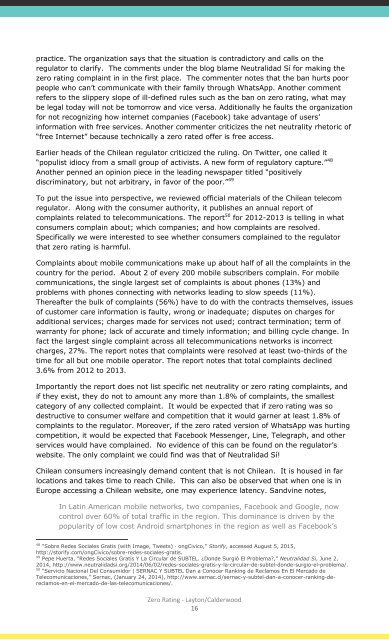Layton
Layton
Layton
You also want an ePaper? Increase the reach of your titles
YUMPU automatically turns print PDFs into web optimized ePapers that Google loves.
practice. The organization says that the situation is contradictory and calls on the<br />
regulator to clarify. The comments under the blog blame Neutralidad Sí for making the<br />
zero rating complaint in in the first place. The commenter notes that the ban hurts poor<br />
people who can’t communicate with their family through WhatsApp. Another comment<br />
refers to the slippery slope of ill-defined rules such as the ban on zero rating, what may<br />
be legal today will not be tomorrow and vice versa. Additionally he faults the organization<br />
for not recognizing how internet companies (Facebook) take advantage of users’<br />
information with free services. Another commenter criticizes the net neutrality rhetoric of<br />
“free Internet” because technically a zero rated offer is free access.<br />
Earlier heads of the Chilean regulator criticized the ruling. On Twitter, one called it<br />
“populist idiocy from a small group of activists. A new form of regulatory capture.” 48<br />
Another penned an opinion piece in the leading newspaper titled “positively<br />
discriminatory, but not arbitrary, in favor of the poor.” 49<br />
To put the issue into perspective, we reviewed official materials of the Chilean telecom<br />
regulator. Along with the consumer authority, it publishes an annual report of<br />
complaints related to telecommunications. The report 50 for 2012-2013 is telling in what<br />
consumers complain about; which companies; and how complaints are resolved.<br />
Specifically we were interested to see whether consumers complained to the regulator<br />
that zero rating is harmful.<br />
Complaints about mobile communications make up about half of all the complaints in the<br />
country for the period. About 2 of every 200 mobile subscribers complain. For mobile<br />
communications, the single largest set of complaints is about phones (13%) and<br />
problems with phones connecting with networks leading to slow speeds (11%).<br />
Thereafter the bulk of complaints (56%) have to do with the contracts themselves, issues<br />
of customer care information is faulty, wrong or inadequate; disputes on charges for<br />
additional services; charges made for services not used; contract termination; term of<br />
warranty for phone; lack of accurate and timely information; and billing cycle change. In<br />
fact the largest single complaint across all telecommunications networks is incorrect<br />
charges, 27%. The report notes that complaints were resolved at least two-thirds of the<br />
time for all but one mobile operator. The report notes that total complaints declined<br />
3.6% from 2012 to 2013.<br />
Importantly the report does not list specific net neutrality or zero rating complaints, and<br />
if they exist, they do not to amount any more than 1.8% of complaints, the smallest<br />
category of any collected complaint. It would be expected that if zero rating was so<br />
destructive to consumer welfare and competition that it would garner at least 1.8% of<br />
complaints to the regulator. Moreover, if the zero rated version of WhatsApp was hurting<br />
competition, it would be expected that Facebook Messenger, Line, Telegraph, and other<br />
services would have complained. No evidence of this can be found on the regulator’s<br />
website. The only complaint we could find was that of Neutralidad Sí!<br />
Chilean consumers increasingly demand content that is not Chilean. It is housed in far<br />
locations and takes time to reach Chile. This can also be observed that when one is in<br />
Europe accessing a Chilean website, one may experience latency. Sandvine notes,<br />
In Latin American mobile networks, two companies, Facebook and Google, now<br />
control over 60% of total traffic in the region. This dominance is driven by the<br />
popularity of low cost Android smartphones in the region as well as Facebook’s<br />
48 “Sobre Redes Sociales Gratis (with Image, Tweets) · ongCivico,” Storify, accessed August 5, 2015,<br />
http://storify.com/ongCivico/sobre-redes-sociales-gratis.<br />
49 Pepe Huerta, “Redes Sociales Gratis Y La Circular de SUBTEL. ¿Donde Surgió El Problema?,” Neutralidad Si, June 2,<br />
2014, http://www.neutralidadsi.org/2014/06/02/redes-sociales-gratis-y-la-circular-de-subtel-donde-surgio-el-problema/.<br />
50 “Servicio Nacional Del Consumidor | SERNAC Y SUBTEL Dan a Conocer Ranking de Reclamos En El Mercado de<br />
Telecomunicaciones,” Sernac, (January 24, 2014), http://www.sernac.cl/sernac-y-subtel-dan-a-conocer-ranking-dereclamos-en-el-mercado-de-las-telecomunicaciones/.<br />
Zero Rating - <strong>Layton</strong>/Calderwood<br />
16


